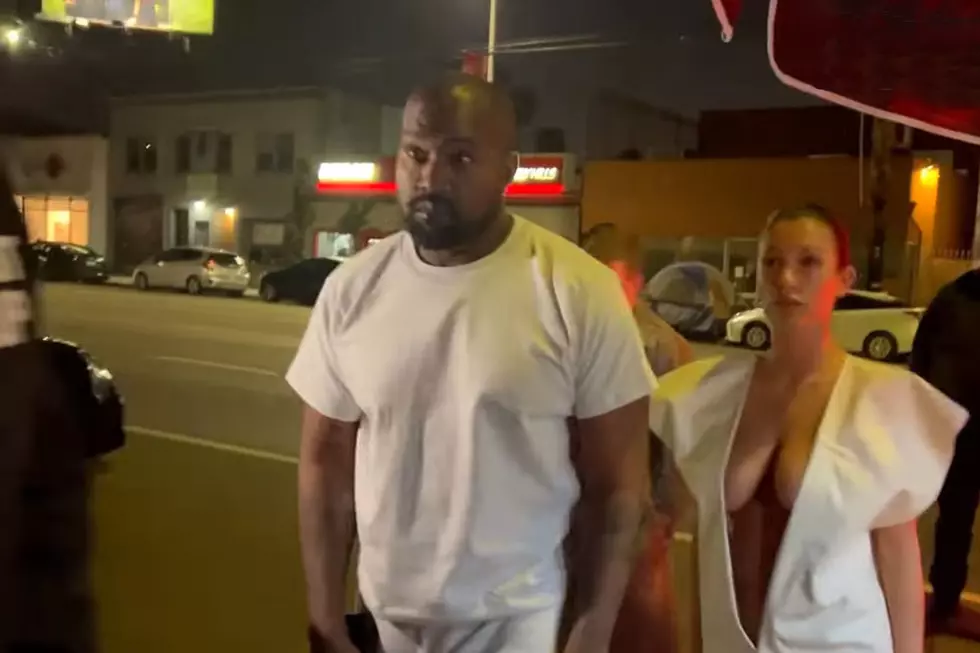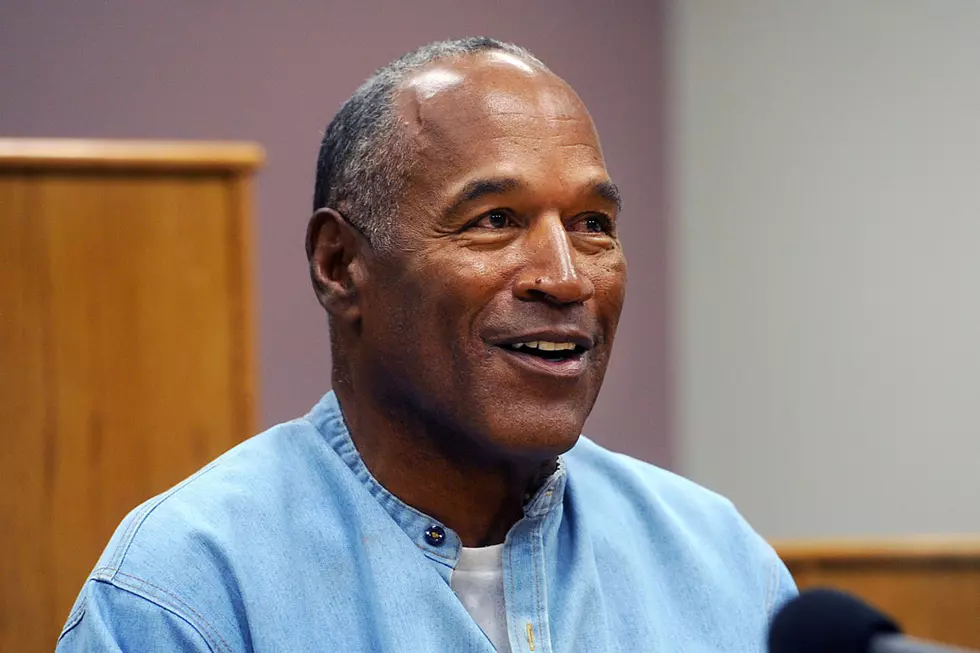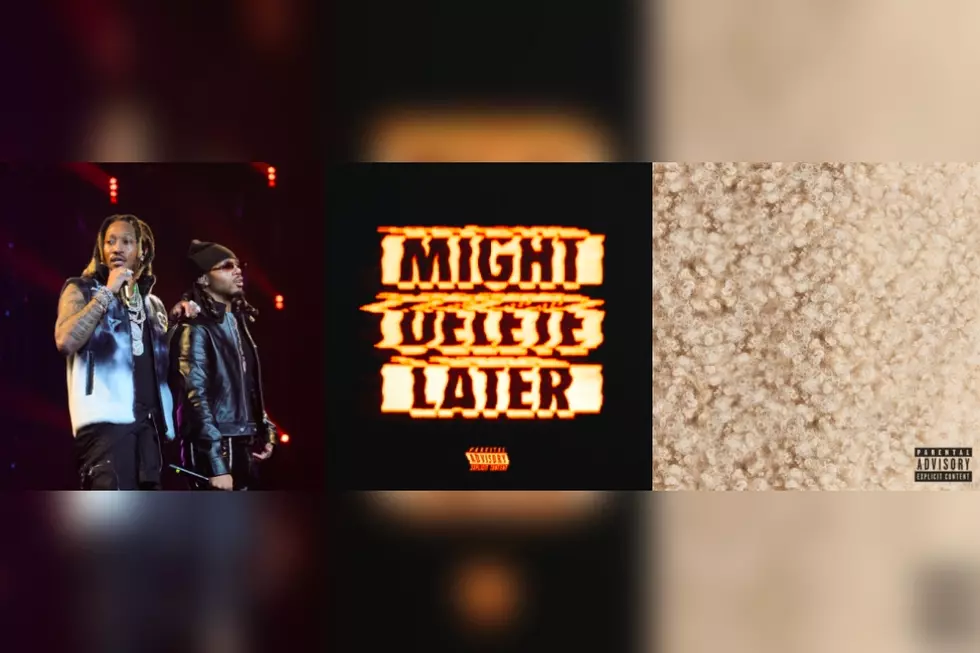![Common: Work Out [Excerpt From the Dec./Jan. 2012 Issue]](http://townsquare.media/site/812/files/2011/12/Common-mag-gallery-2.jpg?w=980&q=75)
Common: Work Out [Excerpt From the Dec./Jan. 2012 Issue]
On a sunny October day, Common rolls up to Chicago's West Loop Athletic Club to shoot hoops. He lives in Los Angeles now, but having played point guard for Luther South High School, after working as a ball boy for the Bulls in the early 1980s, his hometown basketball creds are official. He stretches out, chops it up with a couple old-timers and poses for pictures with beaming employees. Soon Common is playing 21 with the local gym rats. Near the end of the last game, he and several players all have points in the high teens. After snatching a rebound, Common evades a defender, bounces left and floats a 15-foot jumper from the baseline. Game.
Here’s the firsthand scouting report on Common: He’s not a highflier. He doesn’t take acrobatic shots with perilous degrees of difficulty. But at six feet tall and equipped with the muscle density needed to play Hollywood bodyguards, he’s bigger and quicker and stronger than expected. When he has the rock, he jab steps and feints until he gets an open look at the basket. On defense, he crouches low, in the defensive stance of someone who never learned the slippery shortcuts of laziness. In short, he’s a worker. Famed basketball coach John Wooden once said that sports are not for building character—that instead, they reveal it. In the case of Common, a 39-year-old rapper who has built himself into a cross-platform entertainer and kingpin of corporate endorsements, it’s impossible not to see truth in the adage.
Hip-hop has a zillion rags-to-riches narratives, but Common’s might be the most unusual. During a 19-year career that began in 1992 with his largely ignored debut, Can I Borrow a Dollar?, he has never had a single crack the Billboard Top 40 chart. Of the eight albums he’s released on major labels, none has been certified platinum. As an actor, he has not delivered the type of breakthrough performance that launched fellow rappers Will Smith and Ice Cube to cinematic stardom. Yet somehow Common enjoys every trapping of superstardom. According to Forbes, he made $27 million during the past three years. He’s a spokesman for corporations and international brands. He draws appreciative handshakes from men and nervous giggles from women when he ventures out in public. He has even dated Serena Williams, the pinup girl for physically imposing perfection.
In December, Common will release The Dreamer, The Believer into the weird, nebulous space between music, film and corporate marketing. It’s his ninth album, a numeric indicator of a long slog through which few artists are able to carry the hearts and minds of the public. His most recent work—2007’s Finding Forever and 2008’s Universal Mind Control—has been more of a stagger than a victory lap. There was some quality material, but the former thinly retraced the boom-bap blueprint of 2005’s Be, and the latter delved awkwardly into electronic experimentation. At times, especially with Common’s growing focus on acting (his latest project, a series on AMC called Hell on Wheels, debuted in November), rapping has seemed to be his second job.
This time, he promises a rejuvenated performance. The Dreamer, The Believer is produced entirely by Chicago stalwart No I.D., one of Common’s original collaborators from nearly two decades ago. Maybe it’s the time-capsule spirit that makes him so enthusiastic. “I actually think this album is one of the greatest pieces of music I’ve ever been a part of,” Common says. “I think that I was able to open a chamber and find something in me that I hadn’t done in a minute. As much as I want to be one of the greatest actors ever in the world and be the new star in films and television, I really, in my soul, love rapping and MCing.”
FOR MORE OF THE COMMON FEATURE, GO TO PAGE TWO
Still wearing gym clothes, Common slouches in a chair in a 16th-floor suite at Public, a posh Ian Schrager hotel in Chicago’s Gold Coast neighborhood. His quarters are pristine, blinding white: white curtains, white furniture, white candles, white orchids, white walls. It feels like heaven’s waiting room, with three green apples on the coffee table serving as a final test of temptation. “Ask me anything,” he says. “I want the article to be interesting.”
In a genre where youthful rebelliousness trumps just about every other suit, Common knows that he doesn’t have the edgiest reputation. Too many kufis, romantic records and Nag Champa sticks for that. He wants people to know that he drinks, parties and even, on occasion, might wind up watching quivering female flesh at a gentleman’s club. “I think some of the stigma of me being a conscious guy and not enjoying myself has fallen off a little bit,” he says. “I ain’t out all the time, but I have a little fun, and I talk shit a little bit. It ain’t in there like I’m reading a book and trying to philosophize.”
As an example, he describes a boozy birthday dinner for Nas held in September at Catch, a new restaurant in Manhattan’s Meatpacking District. He, Nas, Jay-Z and Steve Stoute sat together at a table, drinking too much wine and swapping industry war stories. “It felt like we had the godfathers,” Common says. His seat at this Apalachin meeting may seem unlikely, but he is indisputably a made man. Once a nasally Midwestern kid, he segued from underground battle rapper to neo-soul moralizer to his current role of dignified adult-contemporary musician. He’s proud of this legacy. “No matter what, me wearing crocheted pants or doing love songs, nobody could ever come to me and say I ain’t a MC. At this point, I feel like I’m one of the greatest to ever do it. I’ll go against anybody when it come to MCing… I grew up watching Muhammad Ali. When I get on the mic, I’m the greatest.”
Still, Common is a refugee from a more tangible, predigital era. He’s never owned a computer, and he paws helplessly at the surface of his new iPad like a kitten at a mirror. When asked
what contemporary rap he listens to, he doesn’t have a long list. “Kanye.” There’s a pause, then he adds Jay-Z and Lil Wayne. In 2012, the man adored among purists for 1994’s “I Used to Love H.E.R.” mostly listens to rappers your mother has heard of. When members of Harlem’s new ASAP collective recently approached Common in Barneys department store in New York, he had no clue who they were. “I definitely will acknowledge I’m not staying up on everything that’s going on,” he says, citing jazz and rock as genres of music he also enjoys. “We need artists like J. Cole and Kendrick Lamar, who really appreciate hip-hop.
I actually like some of Rick Ross’s stuff, as well. His music is fun to me. I could hear a Waka Flocka song in the club and appreciate that it’s got everybody on 30,000 charged up. But usually I breeze through. I’m not seeking it out.”—Ben Detrick
**FOR MORE OF THIS STORY, PICK UP THE DEC./JAN. 2011 ISSUE OF XXL, ON STANDS NOW**
More From XXL









